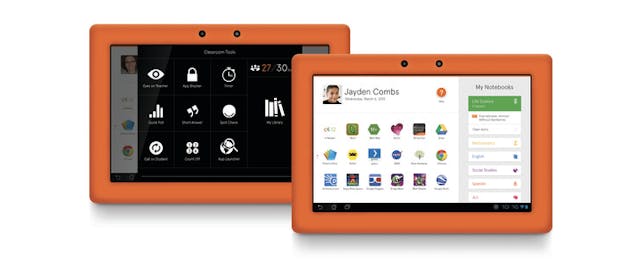Thoughtful and detailed New York Times piece here about using Amplify's tablet in school. The writer, Carlo Rotella, director of American studies at Boston College and a parent of middle school students, spent time in schools Guilford County (Greenboro, NC), which are an early first paying Amplify customer, as well as talking with Joel Klein, Arne Duncan and others. The story is well-worth a read; a couple of points that stood out:
Rotella writes:
I try to be on guard against misrecognizing complex change as simple decline, and I acknowledge that my tendency to dismiss the tech industry’s marketing might blind me to the Amplify tablet’s genuine potential as a teaching tool — and to major new developments reshaping not just the nature of schooling but also the world in which my kids are growing up."
Rotella spoke in detail with a long-time teacher, Sally Hurd Smith, who was initially suspicious of the tablets. Partway through a training session, Smith warmed up to the technology:
"As an older teacher, when all this stuff started coming out, I fought it. You know: ‘This is the new fad, and in two years there’s another.’ ” Good teachers, she felt, already get the “data” that matter just by paying attention to their students, and they reach children with all kinds of learning styles. But the more Smith learned about the tablet and the kind of teaching it made possible, the more she thought that this time was different. “And I realized that if I don’t get with this, it’s going to leave me behind,” she said."
Perhaps the most critical point is made by Greg Anrig, vice president of policy and programs at the Century Foundation and the author of “Beyond the Education Wars: Evidence That Collaboration Builds Effective Schools.” Anrig said:
The research on successful schools and good teaching, [Anrig] said, highlights the importance of relationships among the people in a school: administrators and teachers and students. “None of these studies identify technology as decisive.” Where technology makes a difference, it tends to do so in places with a strong organization dedicated to improving teaching and where students closely engage with teachers and one another. “A device that enhances such interactions is good,” Anrig said. “But kids focused on the device, isolated, cuts into that.”
The piece returns frequently to the theme that it's the combination of traditional teaching skills using new technology that will have the most impact on students.
“Once you develop familiarity with this kind of teaching and your students catch on to the routines, you find you can actually give each student a lot more of yourself,” said Britt [a trainer working with the NC teachers]. “Instead of talking at a group where one-third are bored and one-third are lost, I can have everybody working at their level, and I have time to give the love to you and then you and you.”
A landslide of comments attached to the article from the readers bounce back and forth between embracing and condemning the technology. No one disagrees that teachers are fundamental. Beyond that, debates over what will stretch precious education dollars most effectively--tech? teachers? fighting poverty?--seem to devolve into ideological debates.
Bottomline: Our society is in the midst of profound cultural debate about the goals of education and the methods we use to do it. When the technology was deeply flawed, there was little debate; better technology makes that debate all the more critical.


